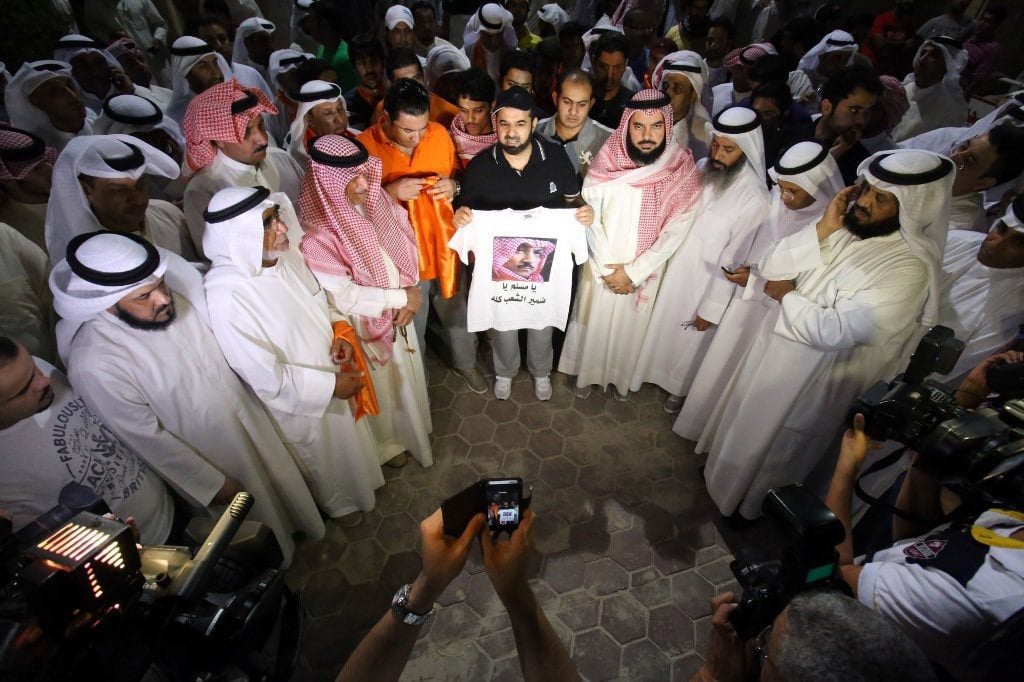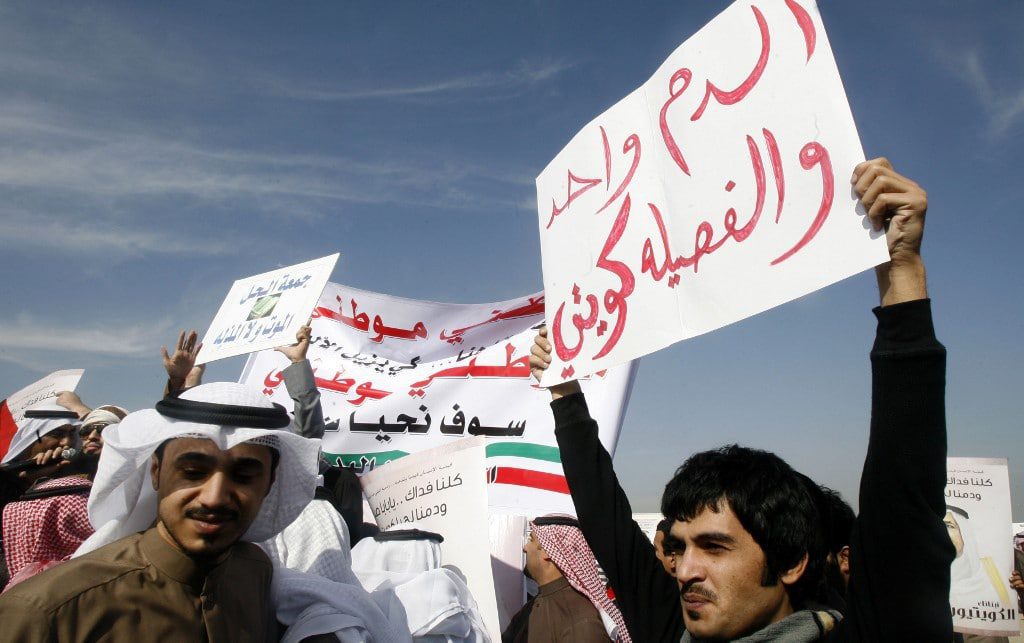
After a relatively calm period, the opposition came to the forefront in June 2014, when thousands of anti-government protesters rallied against the alleged embezzlement of public funds worth billions of dollars, which they said involved government officials. Protesters had responded to a call by the opposition leader Musallam al-Barrak, who accused members of the ruling family, former senior officials, and judges of being involved in corrupt transactions.
Al-Barrak was detained on 2 July for insulting the judiciary and was released on bail after a week. During demonstrations in solidarity with Musallam al-Barrak, four human-rights observers were beaten and arrested by security forces, according to the Gulf Centre for Human Rights. Authorities also dispersed demonstrations calling for the release of dozens of citizens arrested during earlier protests.
Allegations of corruption have been a major issue between the elected parliament and the government dominated by the royal family. In November 2011, the opposition forced Prime Minister Nasser al-Mohammed to resign, because of payments Nasser had allegedly made to members of parliament, whom the opposition had accused of receiving bribes in order to vote with the government. New allegations of official corruption and the squandering of public funds provided an opportune occasion for the opposition to step up its demands for change.
In April, the Opposition Coalition launched a comprehensive, collective plan for reform. The broad coalition, which includes Islamists, nationalists, liberals, and youth activists, agreed on steps to move Kuwaiti politics forward. The coalition has been able to set aside ideological differences, such as the role of Islam in public life. For instance, the Islamic Constitutional Movement, or HADAS (the Muslim Brotherhood) has dropped its insistence that Islamic Sharia law should be the only source of all legislation. The Coalition calls for a full parliamentary system, a stronger legislative, an independent judiciary and revised criminal codes.
In their manifest ‘Towards a Full Parliamentary Democratic System’, the Opposition Coalition describes long-time grievances in Kuwaiti society. Corruption has infiltrated all levels of society: referring to the way the new electoral law was forced upon Kuwaitis and the government (allegedly) has been paying certain MPs, the opposition asserts that the legislative branch has become ‘a tool in the hands of authorities’. Meanwhile, the quality of public services (education, housing, healthcare) has declined; government jobs are assigned to people on the basis of personal relationships (wasta), instead of competence, leading to frustrations among ambitious young Kuwaitis. Furthermore, according to the opposition, the justice system is unfair and human rights are neglected.
Repression
Kuwaiti authorities, faced with increasing calls for political change and an end to corruption, continued the repression that earlier targeted the opposition and those who spoke out on social media. Ever since opposition groups, predating the so-called Arab Spring, began their protests for reforms in 2011, authorities curbed freedom of expression on the Internet, in the press, and on the street. According to Human Rights Watch, in its Universal Periodic Review of Kuwait, the most significant human-rights regression in the last three years is the authorities’ aggressive prosecution of individuals who use social media to criticize local and foreign leaders and national politics and policies.
According to the Gulf Centre for Human Rights, authorities have, since January 2011, prosecuted at least 60 people who expressed critical views on social media, blogs, and in street protests. Dozens of social media users were arrested for messages deemed insulting to the emir, foreign leaders, or Islam. On 27 August 2014, blogger and human-rights activist Mohammed al-Ajmi, who monitored human-rights violations during anti-government protests in July, was detained, pending investigations into one of his tweets, in which he criticised the practice of the revocation of citizenship in Kuwait.
Authorities base prosecution on Article 25 of Kuwait’s 1970 penal code, which prescribes sentences of up to five years in prison for ‘anyone who publicly objects to the rights and authorities of the emir or faults him’, and introduces laws that prohibit insulting the rulers of neighboring countries, the Prophet Mohammed, or Islam.
Kuwait was long known for its high degree of press freedom, particularly when compared to other Gulf states. Criticism of the emir, who has the final say in politics, has, however, always been an exception. It seems that authorities have recently been exploiting this exception to silence all voices of dissent, not just criticism of the emir.
Revoking of citizenship
In the wake of street protests against corruption, the government in June instructed authorities to crack down on people carrying out ‘acts aiming to undermine the country’s security and stability, bringing harm to its institutions’. A week later, the official Kuwait News Agency announced that the citizenship of five people, including a former opposition MP, had been revoked, citing security reasons. In August, ten naturalized Kuwaitis were stripped of their citizenship, as they were officially accused of failing to meet the requirements for citizenship. It included a high-ranking cleric who had criticized the government for bowing to US pressure to clamp down on financial support to rebels in Syria.
The Kuwaiti Nationality Law empowers the government to revoke a person’s citizenship and deport him under various circumstances, including obtaining citizenship through fraud and promoting principles that undermine the well-being of the country. Human Rights Watch notes that the law’s provisions conflict directly with the International Covenant on Civil and Political Rights, which Kuwait has ratified.
Ahmad Jaber al-Shammari, one of the five who were stripped of their citizenship and owner of al-Yom news channel and newspaper, saw his media outlets shut down temporarily for defying a prosecutor-ordered media blackout about a secret probe into an alleged plot by senior officials to overthrow the government.
On 29 September, the government stripped 18 Kuwaitis of citizenship, including the spokesperson of the opposition Popular Action Bloc, Sa’ad al-Ajmi. Out of 18 Kuwaiti nationals, 11 were naturalised citizens who, according to the government, had obtained citizenship through fraud. Others, including al-Ajmi, had dual nationalities, which is illegal in Kuwaiti law. However, activists accuse the government of targeting regime critics by way of revoking their nationality.
Another development that, according to Human Rights Watch, curbs freedom of expression in Kuwait is the new telecommunications law, 37/2014, adopted in May 2014, which gives the government sweeping powers to block content, deny access to the Internet, and revoke licences without explanation.
These developments are part of a larger crackdown that targets both people who call for political reform and suspected financiers of extremist groups. This has caused Kuwait rapidly to lose its reputation as one of the most rights-respecting of the Gulf states, according to Joe Stork, Deputy Director for Middle East and North Africa of Human Rights Watch. With its crackdown, Kuwaiti authorities violate the Kuwaiti constitution, which guarantees citizens’ rights: Article 36 states that
“Every person has the right to express and propagate his opinion verbally, in writing, or otherwise, in accordance with the conditions and procedures specified by law”.
Bidoon

Meanwhile, Kuwaiti authorities have failed to grant Kuwait’s stateless, numbering over 100,000, their legitimate rights, including rights to a free education, health care, housing, and, ultimately, Kuwaiti citizenship.
Kuwait’s bidoon (Arabic, lit., ‘without’) are long-time residents of Kuwait who do not have Kuwaiti citizenship and lack most of the allowances and services enjoyed by Kuwaitis. Before Kuwait’s independence, in 1961, they lived as nomads; at that time, many of them failed to claim citizenship. The government does not recognise the right of these residents to Kuwaiti nationality, claiming they lack the proper documents proving their rights; in fact, it continues to claim that they have hidden their original identity documents issued by Saudi Arabia, Syria, or Iraq. Since 1986, the government has stripped the stateless of the right to all public services, including free education, housing, and health care, restricting it to Kuwaiti citizens.
Kuwait’s stateless, having no right of residence in Kuwait, live in shabby, neglected neighborhoods on the outskirts of Kuwait City, contrasting with the luxurious accommodation Kuwaitis are accustomed to. Without the right to legal employment, the bidoon depend on informal employment or on income from relatives who are Kuwaiti citizens.
The first major protests by bidoon demanding full rights were suppressed by Kuwaiti authorities in February 2011. The government did grant the bidoon benefits and services such as free health care and education and registration of births, marriages, and deaths, but some bidoon have complained about administrative hurdles to accessing these benefits. Authorities still define them as ‘illegal residents’ and refuse to grant them citizenship. In 2013, a law was passed to naturalize 4000 ‘foreigners’, but that benefited only children of Kuwaiti mothers and foreign fathers (who initially are deemed foreigners).
In recent years, bidoon have been protesting on a small scale, while authorities continue to crack down on demonstrations, citing Kuwaiti law, which bars non-Kuwaitis from participating in public gatherings.
In May 2014, the government reportedly offered to grant the bidoon citizenship of the Arab state of Comoros, in return for economic benefits, similar to a deal agreed to by the United Arab Emirates and Comoros, concerning the Emirati bidoon. That would mean that the stateless in Kuwait would become legal migrant workers, subject to deportation if they commit crimes or other violations punishable by deportation under Kuwaiti law. The announcement was criticized severely by activists, who accused the government of human trafficking.
Although the issue of the bidoon was embraced by the Opposition Coalition, the bidoon have been disappointed, as their cause was not a priority when the opposition dominated the National Assembly (the parliament) in 2012. For the time being, the opposition has, from its perspective, more critical issues to tackle.


